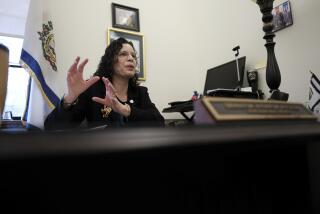Clinton wins by a landslide in W. Virginia
- Share via
CHARLESTON, W.VA. — Hillary Rodham Clinton romped to victory Tuesday in the West Virginia primary, burying Barack Obama in a landslide that seemed unlikely to stop his steady march to the Democratic nomination.
Running in a state tailored to her strengths -- with a large turnout of white, rural and working-class voters -- Clinton posted one of her biggest winning margins. With nearly all of the vote counted, she was leading Obama 67% to 26%.
Speaking to supporters at Charleston’s downtown convention center, Clinton made clear her intention to keep running, even as she praised Obama.
“There are some who wanted to cut this race short,” she said. “They say, ‘Give up, it’s too hard, the mountain is too high.’ But here in West Virginia, you know a thing or two about rough roads to the top of the mountain. . . . I am more determined than ever to carry on this campaign until everyone has had a chance to make their voices heard.”
Obama, who conceded even before the polls closed, left a voicemail message congratulating the New York senator. He campaigned Tuesday in Missouri, a fall battleground, and focused on the presumptive GOP nominee, Sen. John McCain of Arizona, saying he promised four more years of President Bush’s policies.
There were 28 delegates at stake in West Virginia, too few to shake up the race even if Clinton won them all. Under the party’s allocation system, Clinton won 20 delegates to Obama’s eight, according to the Associated Press.
But Clinton is no longer resting her candidacy on the delegate count. She hopes to persuade party leaders, who hold the balance of power, that she would be the more electable candidate against McCain, based on her support among white, blue-collar voters who have not embraced Obama’s candidacy in the same way as black, more affluent and better-educated voters.
“The White House is won in the swing states, and I am winning the swing states,” Clinton said Tuesday night.
But Obama continued to gain superdelegate support, adding four, including Roy Romer, a former Democratic Party chairman and ex-superintendent of Los Angeles public schools. “This race, I believe, is over,” Romer told reporters in a conference call. “It is time for the party to unify . . . and move on to the general election.”
The balloting resumes Tuesday, with Clinton favored in Kentucky and Obama expected to win Oregon. The results could give Obama a majority of all pledged delegates -- those awarded through primaries and caucuses -- at which point he may declare victory.
Since winning North Carolina last week and barely losing Indiana, Obama has picked up more than two dozen superdelegates, the party insiders and members of Congress who are automatically seated at the Democratic nominating convention this summer in Denver. Clinton has gained two.
Obama now has 1,883.5 delegates to 1,717 for Clinton, according to the Associated Press. It will take 2,026 delegates to clinch the nomination.
West Virginia’s demographics closely matched Clinton’s political base. Interviews with voters leaving polling places showed an electorate that was 95% white, less educated and poorer than in most other states. Four in 10 were over age 60, and a little more than half came from rural areas.
Racial attitudes also boosted her performance. About 1 in 5 voters said race influenced their decision, and about 8 in 10 of them backed Clinton.
She campaigned heavily in the state, criticizing Obama’s healthcare proposals as inadequate and pushing her proposal for a summer-long suspension of the federal gas tax. She noted that no Democrat has won the White House in nearly 100 years without carrying West Virginia in November and likened herself to John F. Kennedy, who laid to rest doubts about his candidacy by winning here in 1960. (Kennedy needed a victory to avoid placing the nomination in the hands of party elders; Clinton is attempting the opposite, hoping to extend the race so party elders can make the final decision.)
Clinton campaigned to the sound of Tom Petty’s “I Won’t Back Down,” and many voters applauded the sentiment as they headed to the polls on a perfect spring day.
Patricia Anderson, 59, a retired substitute teacher from Stonewood, had already voted for Clinton and was trimming a shrub in the yard of the tidy home she shares with her 90-year-old mother, another Clinton backer. “I just think she has the most solutions to our problems. The Clinton years were good years, and she can bring them back,” Anderson said.
Dorsey Claypool, 62, who drives a garbage truck, intended to vote for Clinton as soon as he finished work. “They always helped me every time I needed something,” Claypool said of Bill and Hillary Clinton. “They are good people.”
Asked about Obama, Claypool hesitated, then said he would not vote for him because he was black.
Obama appeared just once in the state, campaigning Monday on veterans’ issues and playing pool for the benefit of TV cameras.
It is not unusual for candidates to lose primaries even when their nominations appear inevitable. Jimmy Carter lost a batch of late-voting states in 1976 but still won the Democratic nomination and the White House. In 1984, Gary Hart won four of six contests -- including California -- on the last day of balloting but still lost the Democratic nomination to Walter Mondale.
Obama won a little-noticed contest Tuesday, narrowly edging Clinton in the nonbinding Nebraska primary.
--
faye.fiore@latimes.com
Barabak reported from San Francisco and Fiore from Charleston, W.Va. Times staff writers Michael Finnegan and Richard Simon contributed to this report.
--
(BEGIN TEXT OF INFOBOX)
West Virginia
Hillary Rodham Clinton: 67%
Barack Obama: 26%
98% in; John Edwards wins 7%
Source: Associated Press
More to Read
Get the L.A. Times Politics newsletter
Deeply reported insights into legislation, politics and policy from Sacramento, Washington and beyond. In your inbox twice per week.
You may occasionally receive promotional content from the Los Angeles Times.









